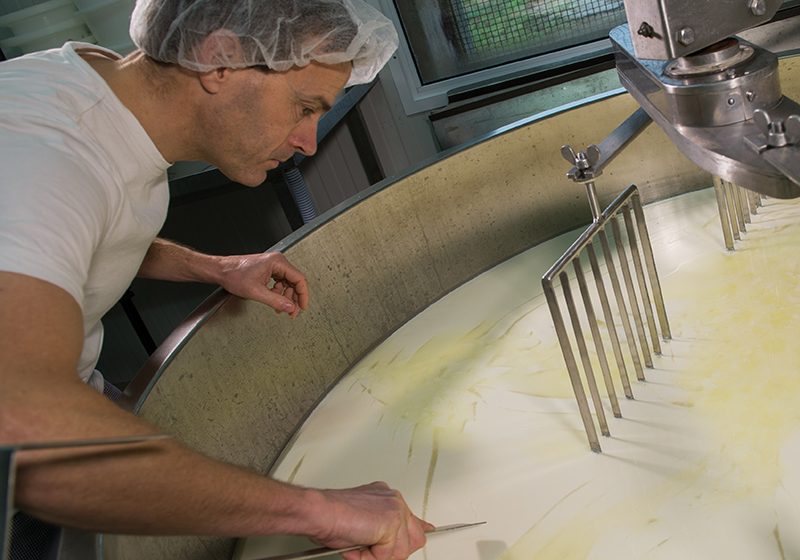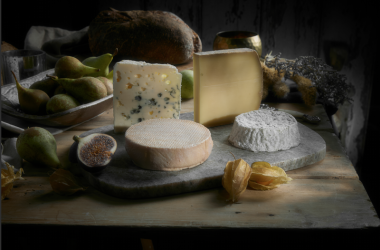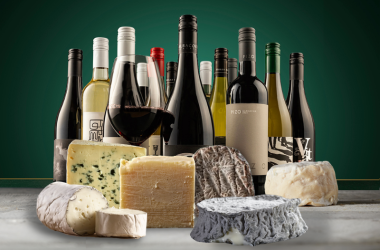Cheese Scientists Offer These Four Cheese Truths

It’s no surprise to us that scientists all over the world dedicate their studies to cheese, after all, what is life without cheese? These honourable men and women have been unearthing cheese truths for years, and we’ve collected together a number of the most interesting historical and the latest breakthroughs in scientific research:
- Cheese does not raise the risk of heart attack or stroke1
In May this year a study was published contradicting the view that dairy products can damage heath, stating that view as “a misconception and mistaken belief”.
The results came from a new meta-analysis of 29 previous studies involving 938,465 participants from around the world undertaken over the last 35 years, including five done in the UK, looking at whether dairy products increase the risk of death from any cause and from either serious heart problems or cardiovascular disease. The study concluded that such foodstuffs did not raise the risk of any of those events and had a “neutral” impact on human health.
One of the researchers was Ian Givens, a professor of food chain nutrition at Reading University, who said: “There’s quite a widespread but mistaken belief among the public that dairy products in general can be bad for you, but that’s a misconception. While it is a widely held belief, our research shows that that’s wrong. There’s been a lot of publicity over the last five to 10 years about how saturated fats increase the risk of cardiovascular disease and a belief has grown up that they must increase the risk, but they don’t.
- Cheese can actually be good for you2
The studies into the relationship between eating saturated fat and heart disease continued with scientists at Oxford, Cambridge and Harvard. When they looked at blood results, they found that higher levels of some saturated fats, in particular margaric acid which is found in cheese, were associated with a lower risk of heart disease.
A Scandinavian team continued to investigate the relationship between high dairy fat and obesity. In this study, researchers followed 1,589 Swedish men for 12 years. They found that those following a low-fat diet (no butter, low-fat milk and no cream) were more likely to develop fat around the gut (central obesity) than those eating butter, high-fat milk and whipping cream.
One reason for this may be that fat is extremely satiating, so when people cut it out of their diet they consciously or unconsciously replace the calories with something else, often refined carbohydrates like white bread or pasta.
In another study published in the New England Journal of Medicine, 7,500 men and women were randomly allocated to either a low-fat diet or a much higher fat Mediterranean diet. The results again showed the high-fat group coming out top.
- Cheese makes wine taste better3
Whilst we may have all suspected this to be the case, scientists have now proven this to be true. The results were published in the journal Food Science by researchers at the Centre for Taste and Feeding Behaviour in Dijon, France, who asked 31 wine buffs to sample a number of different wines and cheeses and rate their enjoyment.
Lead researcher Mara Galmarini said “Thanks to our research we learned the duration of the perception of astringency of a certain wine could be reduced after having cheese and the four evaluated cheeses had the same effect,” said “In short, when having a plate of assorted cheeses, the wine will probably taste better no matter which one they choose.”
After tasting a piece of cheese and then taking three sips of wine, the participants were given a list of sensations from which to pick to describe what caught their attention. They then were given a different piece of cheese to nibble, told to take three more sips and again asked to evaluate the wine, repeating the process with each of the cheeses and each of the wines.
The results showed all the wines tasted better after cheese with some lessening the mouth-drying impact of the tannins in the wine.
- Cheese makes you live longer4
Did you know that the French live longer than any other nationality in Europe, despite having a diet high in salt and fat? It’s known as the ‘French Paradox’ and scientists think they’ve finally found out why.
Consumption of red wine has been thought to be a factor but a new study shows “Observations indicate that consumption of red wine alone cannot explain the paradox and perhaps some other constituents of the typical French diet could be responsible for reduced cardiovascular mortality.” They have narrowed it down to moulded cheeses.
They found that Roquefort in particular has anti-inflammatory properties, and that these properties worked best the riper the cheese. The properties of the blue cheese were found to work best in acidic environments of the body, such as the lining of the stomach or the skin surface.
The scientists said, “We hypothesize that cheese consumption, especially of moulded varieties, may contribute to the occurrence of the ‘French paradox.’ Moulded cheeses, including Roquefort, may be even more favourable to cardiovascular health.”
Everything in life should be enjoyed with moderation, but we’re glad to hear we can enjoy a little cheese indulgence from time to time, especially if it may make you healthy, live longer, and make your wine taste better!
2http://www.telegraph.co.uk/food-and-drink/news/high-fat-cheese-the-secret-to-a-healthy-life/
3http://onlinelibrary.wiley.com/doi/10.1111/1750-3841.13500/abstract;jsessionid=354E1EB6C034616141A3E1F5E3D06FDF.f03t04 – Cheese makes wine taste better – proper title: “Use of Multi-Intake Temporal Dominance of Sensations (TDS) to Evaluate the Influence of Cheese on Wine Perception.”












